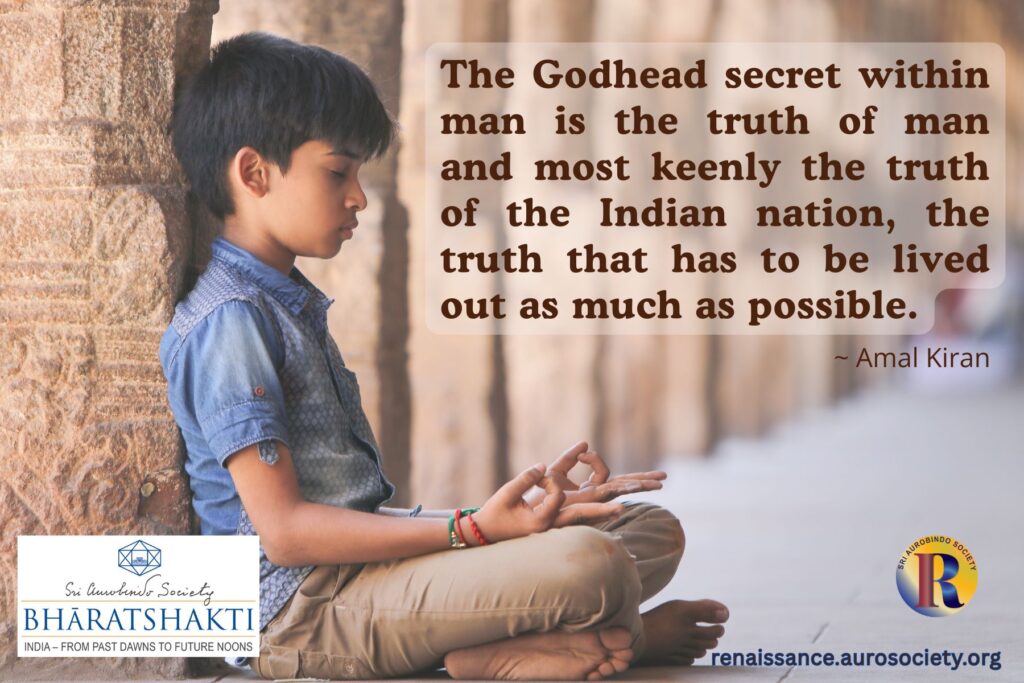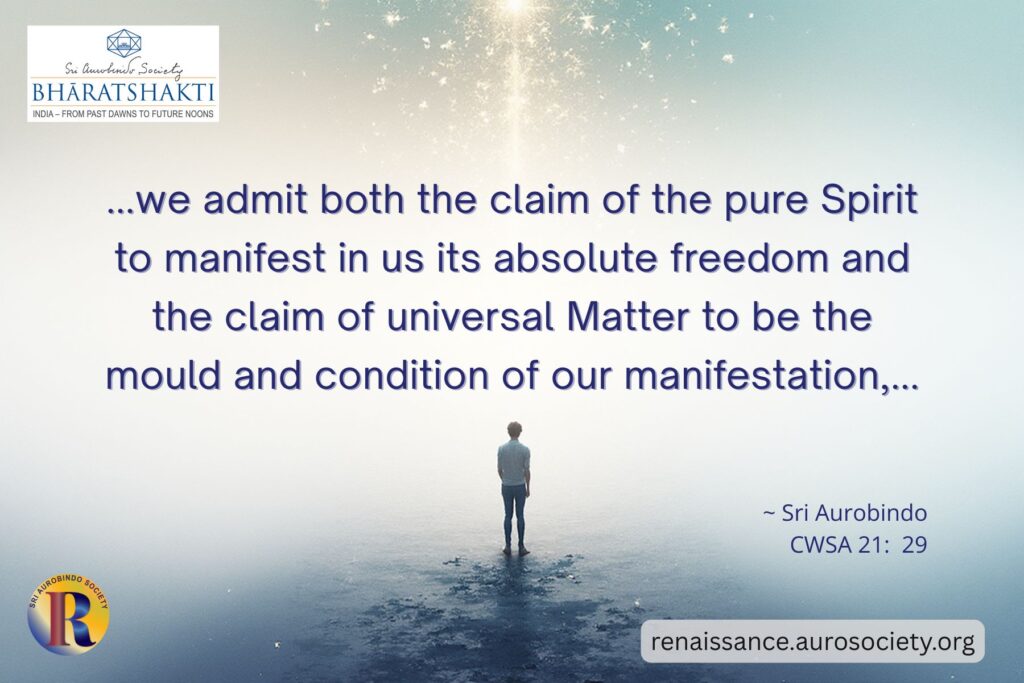Volume V, Issue 2
Author: Mangesh V. Nadkarni
CONTINUED FROM PART 2

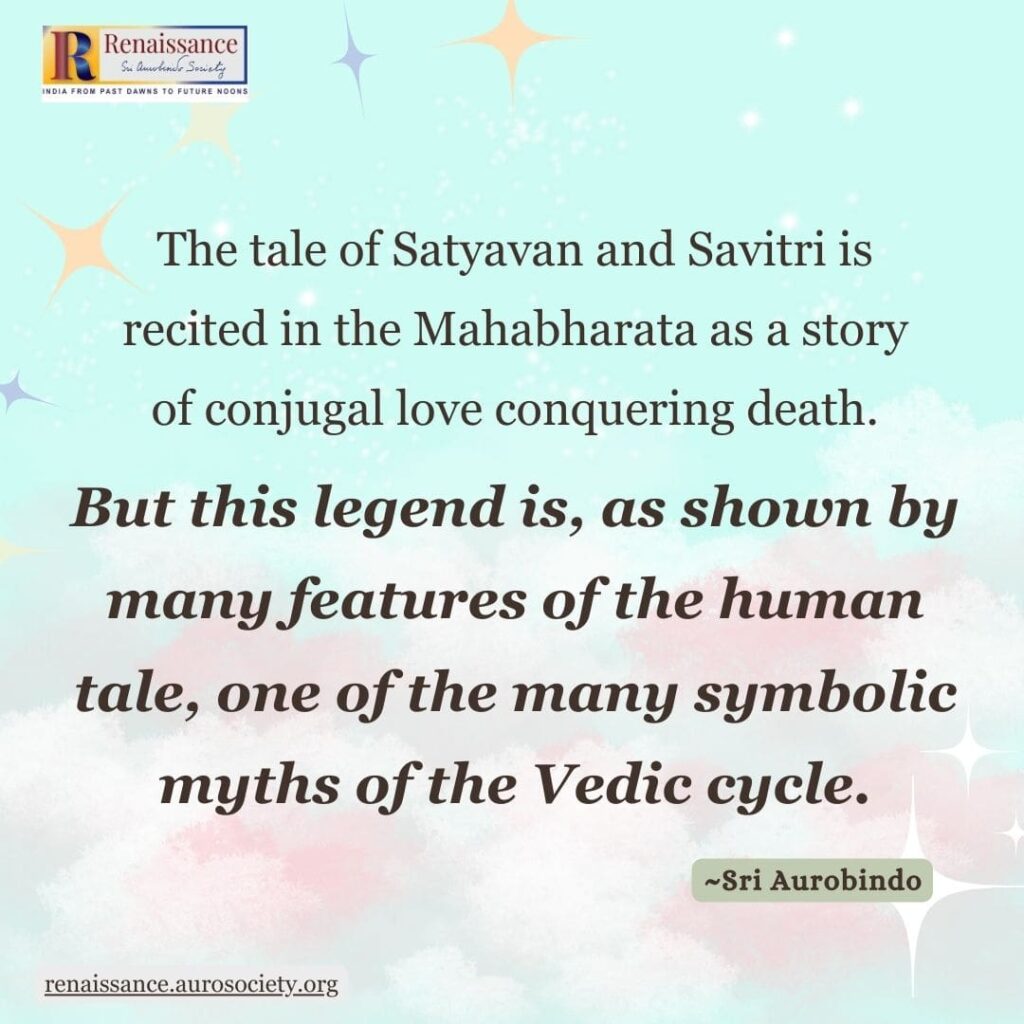
Now the next major departure. In the Mahabharata story, Yama is just the God of Death, like other gods. But in Sri Aurobindo’s story, Yama represents not just the God of Death. He represents all the forces that oppose evolutionary progress. Yama is Hitler, Yama is Mussolini, Yama is everybody that dampens human enthusiasm, the human spirit for progress, for harmony.
Just as Savitri symbolises the upward movement, the divine love that has come down from the supreme heights so that the human aspirant can progress, all that represents obstacles to this human progress is represented by the God of Death.
The final departure, a very significant one, is that in the original story there is a kind of a dialogue, a colloquy between Savitri and the God of Death.
It is a very interesting discussion. And Savitri emerges as a very smart, very well-spoken, very well-read young woman who dazzles Yama by her eloquence, her diction, her good manners, her reading. And Yama, who is very pleased with the performance of this young girl, keeps giving her boon after boon.
Before Yama knows what he has done, he has already blessed Savitri to be the mother of 100 sons. Now, she says, the righteous way for me to have 100 sons is to have my husband back and you are Dharmaraja yourself, so don’t you think it’s proper for you to return Satyavan’s soul? The God of Death, like a benign grandfather, smiles and agrees. So Savitri comes through as an advocate of righteousness, of dharma.

Now, Sri Aurobindo takes up this idea of dharma, and dharma in the 20th century, which is a century of great complexities. If you want to define dharma today, you can’t define it in the terms Vyasa defined it 3000 or 4000 years ago. Vyasa did not know of all that was to happen between then and now.
The human mind has become so complex, so many new issues have come up. And so this time, this debate between Yama and Savitri in Sri Aurobindo’s epic is a dazzling display of all kinds of intellectual positions. Yama takes various intellectual positions and tries to argue with Savitri.
And here in this enterprise Yama takes almost every conceivable philosophical position one could take against Sri Aurobindo’s own enterprise. Nobody has said it is possible to establish on earth the Kingdom of God. The Kingdom of God, of course, can be, but always on the other side of death, not here and now.
This is Sri Aurobindo’s claim: this terrestrial life will be made perfect here and now; this was and is the aim of his Yoga.
As you can see, he was talking about a new level of consciousness emerging, the supermind coming down, and so on. If you go around and ask people if they accept what Sri Aurobindo has said, most people, if they are sympathetic, will say — Oh, he was a great dreamer but I don’t think it is possible. Why is it not possible? There are a number of reasons. Why did Shankaracharya not talk about it, Madhvacharya not talk about it, somebody else not talk about it? So why does Sri Aurobindo talk about it?
If you want to find the strongest arguments against Sri Aurobindo and his views, you don’t have to read any of his critics, you just have to read Savitri where Yama expresses them so powerfully.
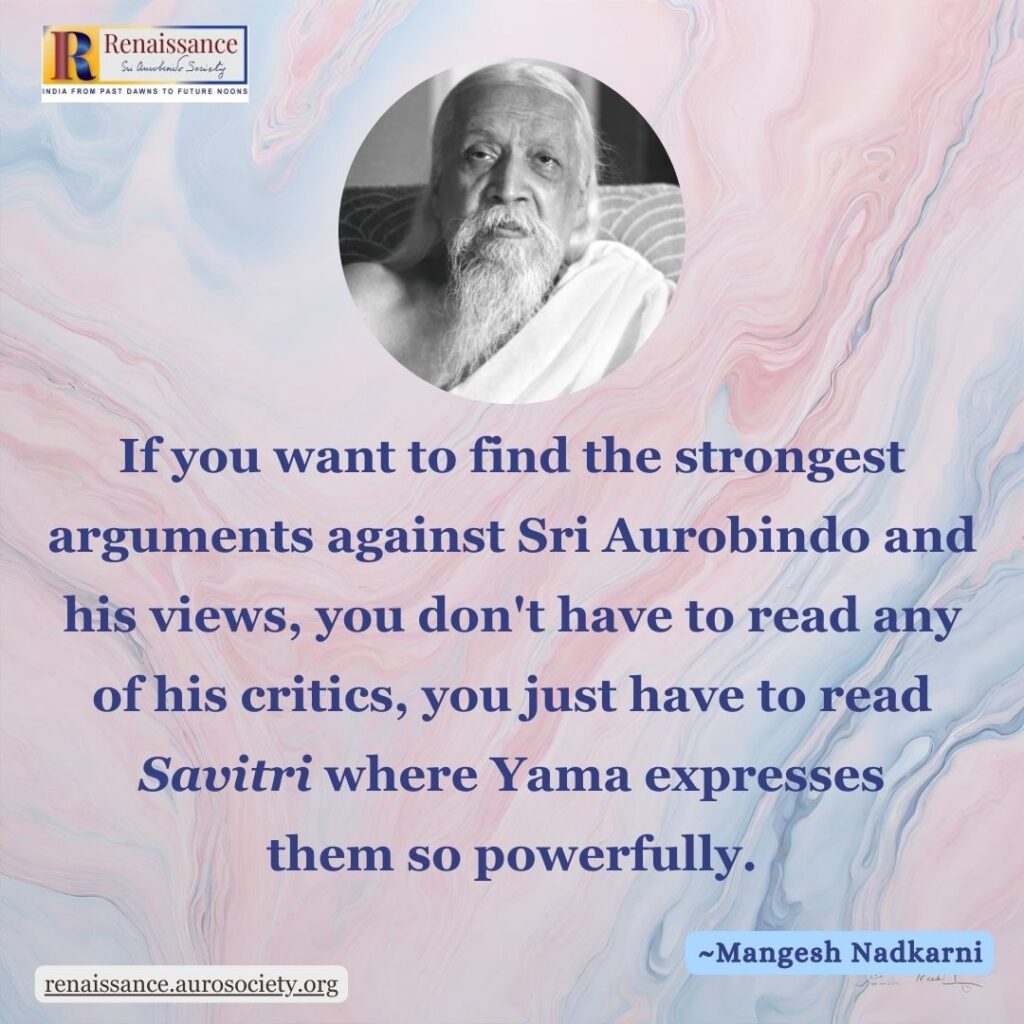
At one time he argues from the point of a nihilist. And you wonder whether he is not himself arguing against Sri Aurobindo. At another time he argues from the position of realism. A third time, he takes the position of absolute Vedanta, absolute adwaita. At another point he takes the Buddhist viewpoint.
And as Yama takes these various positions, Savitri confronts him and tries to answer. She tries to clarify why what she is trying to do is still probable for what has to be done.
Thus, this is a very interesting part of the epic. Books 9, 10, and 11 are comprised of the God of Death and Savitri engaged in this debate. That is something new, new in spirit, because Sri Aurobindo was writing in the 20th century.
These are the different ways in which the story of Savitri in Sri Aurobindo’s epic comes out as different from the original story in Vyasa’s epic.
I tried to point out earlier what Sri Aurobindo must have found fascinating about this story of Savitri. I referred to two other poems of his: one is Urvasie and the other Love and Death. In both these poems there are three characters: love, death and life on earth. There is a confrontation of these three and Sri Aurobindo takes up and develops this story in different ways.
What fascinates me most about Savitri is that Savitri is not willing to bargain life on earth for anything the God of Death is willing to give her.
She says, if you want to give me anything at all, it must have meaning in terms of earthly existence. Nothing here has any value in terms of earthly existence unless it has a material manifestation. It is quite surprising! Nobody in the entire spiritual history of mankind affirmed the claims of matter so unequivocally as Sri Aurobindo.
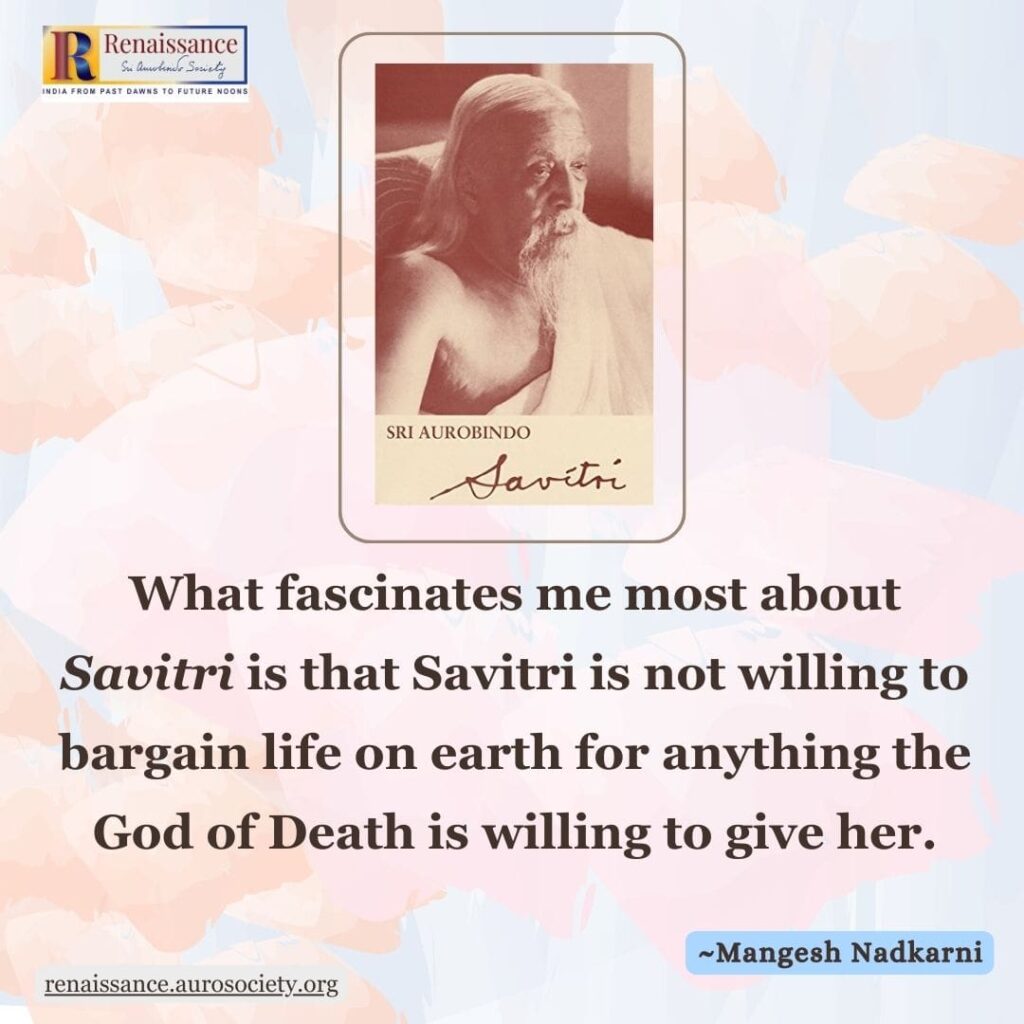
Even if God has to come down here, God has to first of all to prepare matter. The laws of matter have to be recognised, have to be respected. God chose to create this world out of matter, so matter also is divine. Matter also has its very important claims. Therefore, any perfection you can think of must be realised in material terms here on earth.
As I pointed out, the story of Savitri begins as a Vedic myth. And what Sri Aurobindo must have found in that story he himself talks about it in a note. I’ll read that note. If you have the new edition of Savitri, it’s printed at the very beginning, but it is found in other writings also.
The tale of Satyavan and Savitri is recited in the Mahabharata as a story of conjugal love conquering death. But this legend is, as shown by many features of the human tale, one of the many symbolic myths of the Vedic cycle.
~ Sri Aurobindo, A Note, CWSA, Vol. 34, Savitri
When a Vedic myth becomes a Puranic story, very often it takes a popular form. In taking a popular form, the central thrust of the myth is lost and that’s why the Satyavan and Savitri story is generally regarded as a story of the glory of parthiva love. However, the original point is as Sri Aurobindo points out,
Satyavan is the soul carrying the divine truth of being within itself but descended into the grip of death and ignorance;
~ Sri Aurobindo
I often tell people that there are three stories in this: one is, of course, the inner story of Sri Aurobindo’s yoga and quest; two, the Mother’s yoga and quest; and three, each one of us is a character in this story.
We all begin our lives with the aspiration for truth but in time we get lost, waylaid as it were, by forces of ignorance, and caught up finally by death. That is Satyavan—each one of us carries Satyavan within us. This is the Satyavan who is here, caught up in material ignorance, and…
Savitri is the Divine Word, daughter of the Sun, goddess of the supreme Truth who comes down and is born to save;
~ Sri Aurobindo
Savitri is the Divine’s Grace which comes down and tries to save the human soul which is an aspirant to truth, which is always, as we say tamasoma jyotirgamaya, asatoma satgamaya. This is the soul, this is the aspiration we all carry within us. The quest for the Infinite is the only quest that we all have. It is very often camouflaged. We go after finite things, but why do the finite things never really satisfy us?
This simply means that nothing will satisfy the human soul except the Infinite.
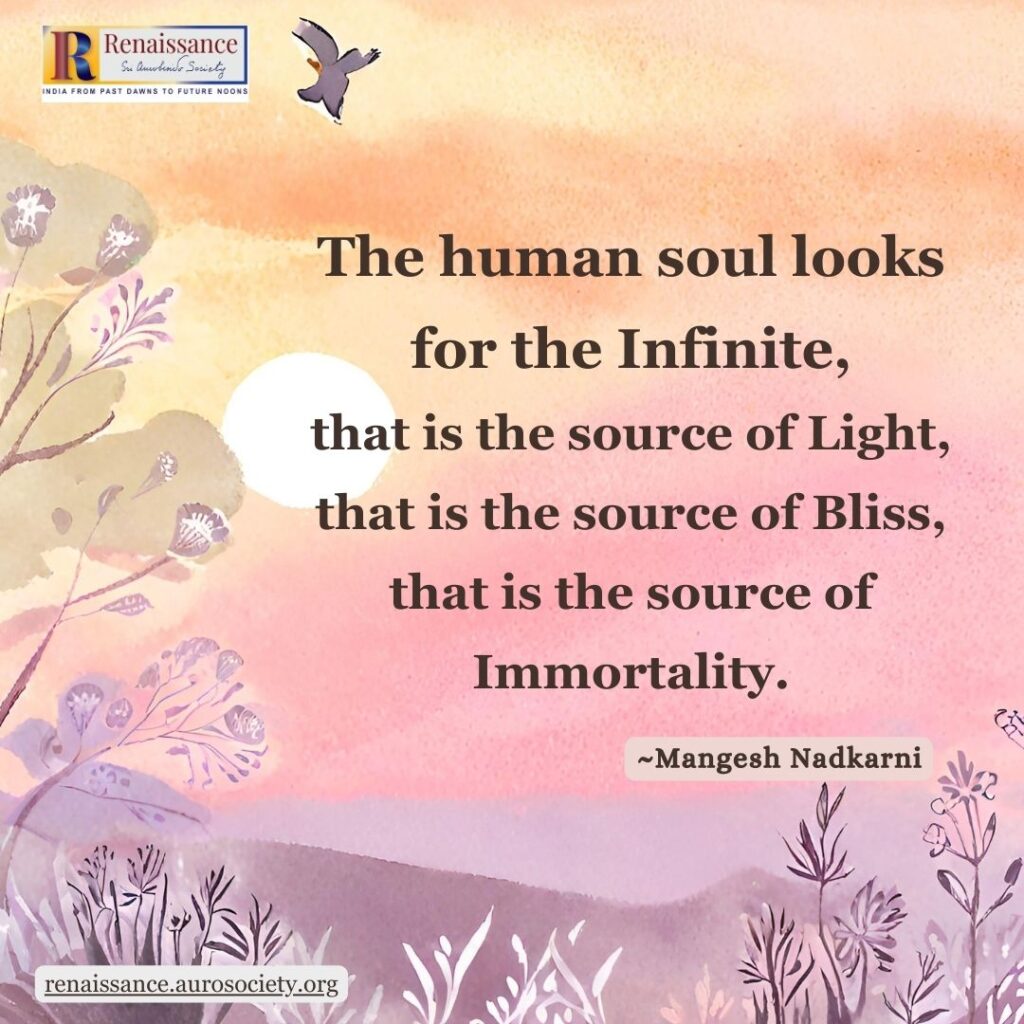
The human soul looks for the Infinite, that is the source of Light, that is the source of Bliss, that is the source of Immortality. But since we don’t know what we are looking for we think we are looking for wealth, we are looking for faith, we are looking for name, we are looking for power, and until this entire journey is finished, we won’t hear the call of the enchanting flute of the Lord. And this divine Grace, this Savitri comes down to help this aspiring soul of man to evolve further. That’s what Sri Aurobindo is saying.
Who is Aswapati?
Aswapati, Lord of the Horse, her human father is the Lord of Tapasya, the concentrated energy of spiritual endeavour that helps us to rise from the mortal to the immortal planes;
~ Sri Aurobindo
Even before Savitri can be born you require a ground prepared by Aswapati. You need this concentrated spiritual energy. This has to be produced first, then only can Savitri be born.
Who is Dyumatsena?
Dyumatsena, Lord of the Shining Hosts, father of Satyavan, is the Divine Mind, here fallen blind, losing its celestial kingdom of vision, and through that loss its kingdom of glory.
~ Sri Aurobindo

